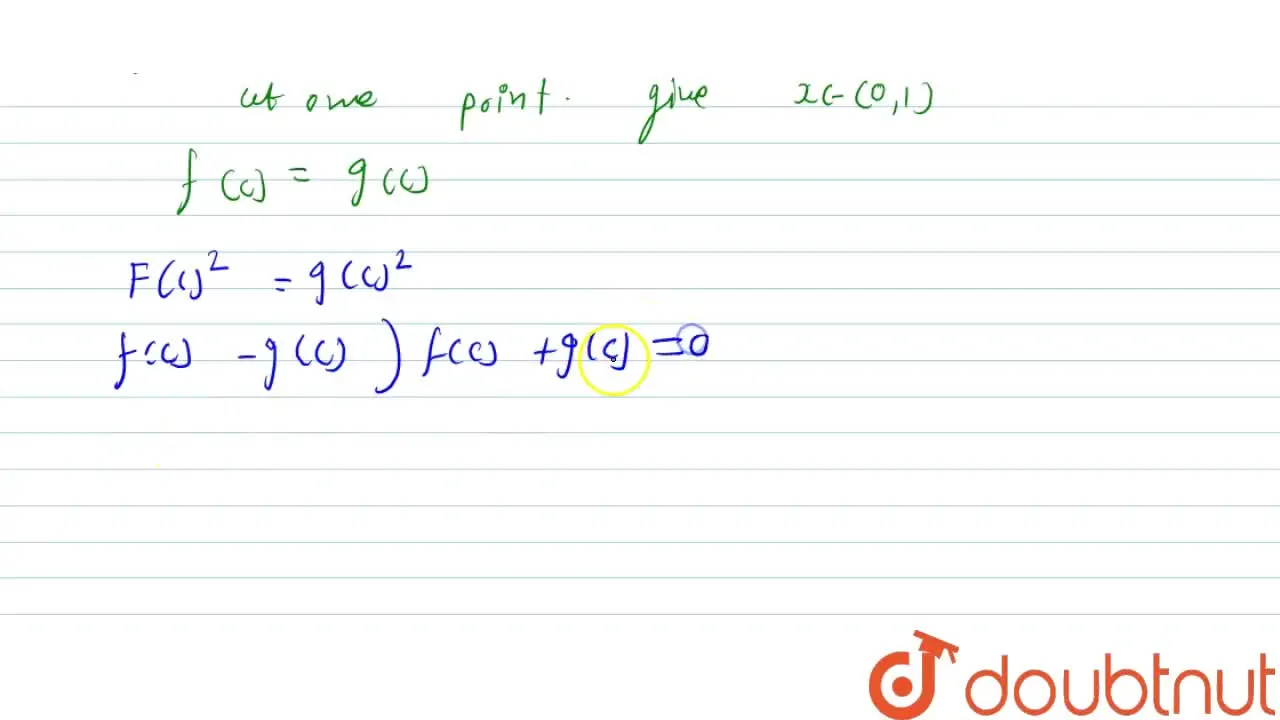about to only mathematics
The correct Answer is:A, D
Since f(x) and g(x) are continuous on [0,1]. So, they attain their maximum and minimum values in [0,1] Suppose f(x) and g(x) attains their maximum values in [0,1]. Suppose f(x) and g(x) attain their maximum values at respectively. It is given that
Let h(x)=f(x)-g(x). Then h(x) is continuous on [0,1] such that
Therefore, there exists such that
Clearly, f(c)=g(c) satisfy options (a) and (d).
Related Playlists
- BOOK - OBJECTIVE RD SHARMA ENGLISHCHAPTER - CONTINUITY AND DIFFERENTIABILITYEXERCISE - Section II - Assertion Reason Type13videos
CONTINUITY AND DIFFERENTIABILITY
- BOOK - OBJECTIVE RD SHARMA ENGLISHCHAPTER - CONTINUITY AND DIFFERENTIABILITYEXERCISE - Exercise87videos
CONTINUITY AND DIFFERENTIABILITY
- BOOK - OBJECTIVE RD SHARMA ENGLISHCHAPTER - CONTINUITY AND DIFFERENTIABILITYEXERCISE - Exercise87videos
CONTINUITY AND DIFFERENTIABILITY
- BOOK - OBJECTIVE RD SHARMA ENGLISHCHAPTER - COMPLEX NUMBERS EXERCISE - Chapter Test58videos
COMPLEX NUMBERS
- BOOK - OBJECTIVE RD SHARMA ENGLISHCHAPTER - DEFINITE INTEGRALSEXERCISE - Chapter Test 256videos
DEFINITE INTEGRALS
Similar Questions
In a certain collage, the ratio of mathematics majors to English majors is 3:8. If in the following school year the number of mathematics majors increase 20%, and the number of English majors decrease 15%, what is the new ratio of mathematics majors to English majors?
View SolutionSTATEMENT-1 : Magnetic poles are only mathematical assumptions and have no real existence .
and
STATEMENT-2 : Magnetic field lines are always in closed loops .View Solution72% of 25 students are good in mathematics. How many are not good in mathematics?
View Solutionin a class of 35 students , 17 have taken Mathematics , 10 have taken mathematics but not economics if each student has taken erither mathematics Of Economics or both , then the number of students who have taken Economics but not mathematics is
View SolutionRahim obtained 60 marks out of 75 in Mathematics. Find the percentage of marks obtained by Rahim in Mathematics.
View SolutionThere are five books on Mathematics and 6 books on Physics in a book shop. In how many ways can a student buy : (i) a Mathematics book and a Physics book (ii) either a Mathematics book or a Physics book?
View SolutionA bag contains a total of 20 books on physics and mathematics. Ten books are chosen from the bag and it is found that it contains 6 books of mathematics. Find out the probability that the remaining books in the bag contains 2 books on mathematics.
View SolutionFrom 50 students taking examinations in mathematics, physics and chemistry,37 passed mathematics, 24 physics and 43 chemistry. At most 19 passed mathematics and physics, at most 29 mathematics and chemistry and at most 20 physics and chemistry. Find the largest possible number that could have passed all three exams.
View SolutionFrom 50 students taking examinations in mathematics, physics and chemistry,37 passed mathematics, 24 physics and 43 chemistry. At most 19 passed mathematics and physics, at most 29 mathematics and chemistry and at most 20 physics and chemistry. Find the largest possible number that could have passed all three exams.
View Solutioncheck whether it is statement or not .Do you like mathematics ?
View Solution


